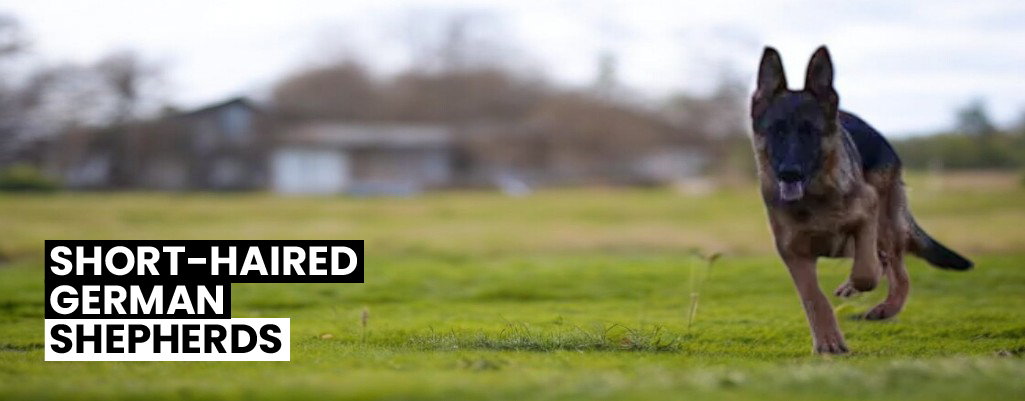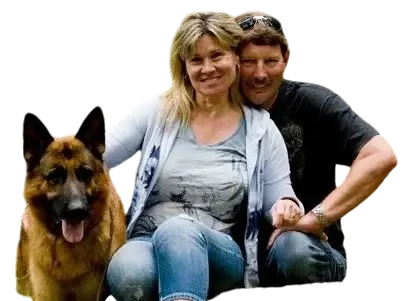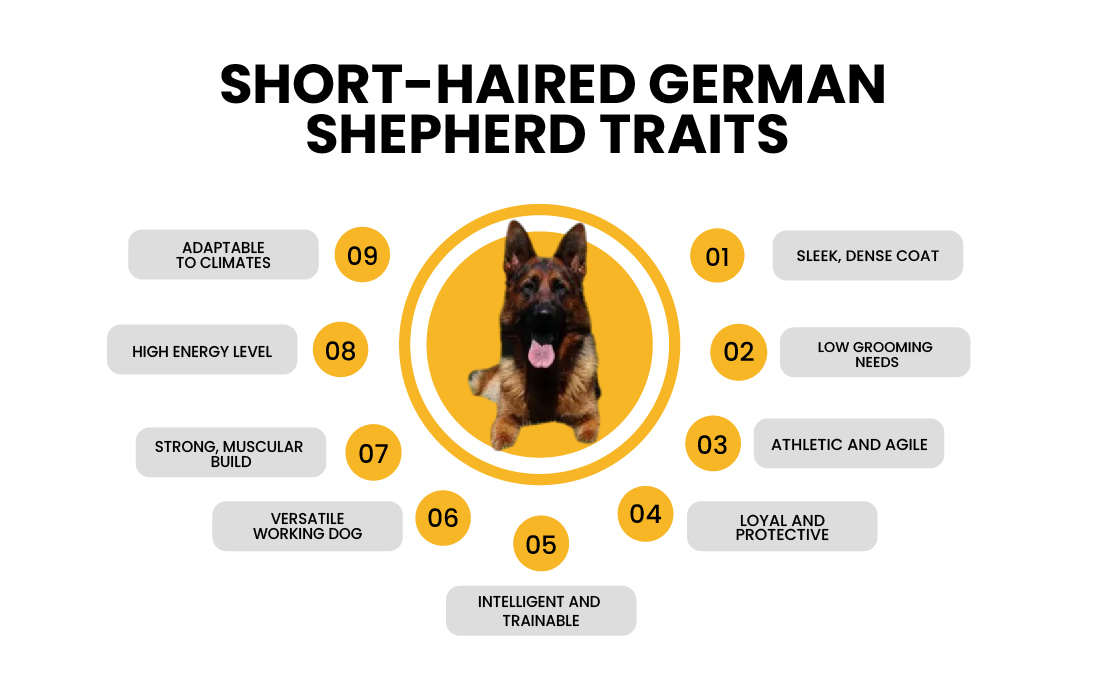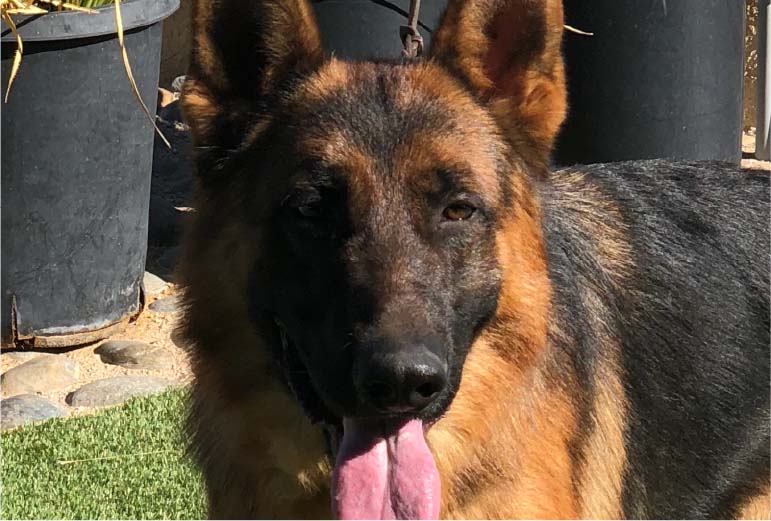
Kempkes Executive K9
Short-haired German Shepherds are a striking blend of elegance and functionality, boasting a sleek, athletic appearance that attracts dog lovers and working professionals alike. With their smooth, glossy coats and well-defined muscles, these dogs exude a sense of strength and agility that sets them apart from their fluffier counterparts.
At Kempkes Executive K9s, we appreciate the unique charm of short-haired German Shepherds, celebrating their physical beauty, unparalleled intelligence, and unwavering loyalty. Ideal for various roles, from devoted family companions to vigilant protection dogs, short-haired GSDs are as versatile as they are visually stunning.
This post explains everything you need about short-haired German Shepherds, including their origin, physical traits, personality, and care needs.
Quick Summary:
- Short-haired German Shepherds are distinguished by their sleek, glossy coats and athletic build, enhancing their functionality and aesthetic appeal.
- Proper grooming practices are vital for maintaining their minimal shedding and overall coat health.
- These dogs require regular physical activity and mental stimulation to manage their high energy levels effectively.
- A balanced diet and routine veterinary care are crucial for their long-term health and vitality.
Origin of the Short-Haired German Shepherd
Short-haired German Shepherds are often the most recognized variety of the German Shepherd breed. Their distinct appearance, strong build, and reputation as exceptional working dogs make them highly sought-after. The German Shepherd breed was first developed in the late 19th century by Captain Max von Stephanitz in Germany. His vision was to create an ideal working dog with unmatched intelligence, stamina, and loyalty. He made a dog suited for herding and guarding livestock through selective breeding.
Short-haired German Shepherds, with their dense, close-fitting coats, were especially favored for their resilience and easy care in various climates, making them ideal working dogs in both urban and rural settings.
CALL Michael and Jeannette Today!
We are ready to place your new Elite German Shepherd in your home.

Characteristics of Short-Haired German Shepherds
Short-haired German Shepherds, also known as standard or stock coat German Shepherds, are the most common variety of the breed.

1. Coat and Appearance
Short-haired German Shepherds have a dense double coat, weather-resistant outer layer, and softer undercoat. This provides them with natural protection against the elements, making them well-suited for various climates.
Their outer coat is around 1 to 2 inches long, which is short enough to require minimal maintenance but long enough to offer protection.
Short-haired German Shepherds come in various colors, including classic black and tan, sable, all-black, and occasionally rare colors like liver or blue.
2. Temperament
Short-haired German Shepherds are known for their unwavering loyalty and natural protective instincts, making them excellent guard dogs and family protectors.
With one of the highest levels of intelligence among dog breeds, they are quick learners and respond well to consistent training. They excel in obedience and can quickly learn complex commands and tasks.
Known for their high energy, short-haired German Shepherds thrive with daily exercise and mental stimulation. They enjoy running, playing fetch, and engaging in interactive play with their families.
3. Physical Strength and Agility
Their muscular, athletic build contributes to their agility and strength. This physical power is why they are widely used in police work, search and rescue, and military service.
Their physical fitness and stamina mean they can handle long periods of activity, whether hiking, running, or agility training.
Despite their strength, they have a balanced and graceful gait, allowing them to move quickly and stealthily when needed.
4. Health and Longevity
Like all German Shepherds, short-haired varieties can be prone to health problems like hip and elbow dysplasia, digestive issues, and certain genetic conditions. Regular vet visits and maintaining a healthy diet can help manage these risks.
Short-haired German Shepherds generally live between 9 and 13 years. A balanced diet, exercise, and preventive healthcare can extend their lifespan and improve their quality of life.
Their double coat provides insulation in both warm and cold weather, though extreme climates require additional care, like hydration in the heat and dog coats in extreme cold.
5. Grooming and Maintenance
Short-haired German Shepherds do shed, especially during seasonal changes, when they shed their undercoat. Regular brushing, about once a week, helps control shedding and keeps their coat healthy.
They do not require frequent baths unless they get particularly dirty, as over-bathing can strip their coat of essential oils.
Like all dogs, they need routine dental care to prevent plaque buildup and regular nail trimming to keep their paws healthy.
6. Social Behavior
They are affectionate and often form strong bonds with their family members, including children when socialized early.
Short-haired German Shepherds are keenly alert, making them excellent watchdogs. They can be wary of strangers, so early socialization is essential to ensure balanced behavior.
While naturally protective, they can get along well with other pets if properly socialized. Introducing them to other pets at a young age helps foster good relationships.
A study shows that the dog’s hair analysis helps to evaluate the human-dog relationship, as hair fall in dogs represents their stress level.
How to Care for a Short-Haired German Shepherd?

Kempkes Executive K9
Short-haired German Shepherds are relatively easy to care for but have specific needs that should be met to ensure they remain happy and healthy.
Grooming Needs
Even though short-haired German Shepherds have a manageable coat, they still benefit from regular grooming.
- Weekly brushing helps control shedding and keeps their coat healthy.
- Bathing should be done only when necessary, as frequent baths can strip the coat of its natural oils.
- Daily brushing is ideal for managing their coat and reducing hair around the home during the peak shedding seasons.
Diet and Nutrition for a Healthy Coat
- A high-quality diet rich in protein and required vitamins like C, B, A, and more is essential for maintaining the health of a German Shepherd’s coat.
- Look for the best dog food with whole meats and essential fatty acids to support skin health and coat shine.
- Avoid foods with excessive fillers or artificial additives, as these can lead to skin issues and a dull coat.
Exercise Requirements and Tips
Short-haired German Shepherds are highly energetic and require regular exercise to stay physically and mentally fit.
- Aim for at least 1-2 hours of activity daily, including walks, playtime, and mental stimulation through training or puzzle toys.
- Activities like fetch, agility courses, and different training are ideal for keeping them engaged and channeling their energy constructively.
- Regular exercise also helps prevent health issues like obesity, which can put undue stress on their joints.
Why Short-Haired German Shepherds Make Great Pets?
Short-haired German Shepherds are popular for a reason: they bring incredible companionship and reliability to families and individuals alike. Here’s why they’re an excellent choice as pets.
Benefits for Families
For families, short-haired German Shepherds are a great choice because of their gentle nature with children and protective instincts. They bond closely with their family members and are known for being excellent watchdogs. Their relatively low-maintenance coat also makes them a good fit for families who may not have the time for intensive grooming.
Suitability for Active Individuals
Short-haired German Shepherds are ideal for active individuals who can match their energy and enthusiasm. If you enjoy hiking, jogging, or any outdoor activity, this breed will make a great companion. They love having a job or purpose, so providing them with consistent mental and physical challenges helps keep them satisfied.
FAQs
Are short-haired German Shepherds more common than long-haired ones?
Yes, short-haired German Shepherds are more common, partly due to their suitability for various working roles and ease of care compared to long-haired varieties.
Are short-haired German Shepherds aggressive?
No, they are typically not aggressive if well-socialized and trained. However, they are protective and may be wary of strangers, which is why early socialization is essential to help them differentiate between friends and potential threats.
Do short-haired German Shepherds bark a lot?
They may bark to alert their owners of perceived threats but are not typically excessive barkers. Proper training and socialization can help manage barking tendencies.
The Bottom Line
While these dogs require less maintenance than their long-haired counterparts, regular grooming, consistent training, and sufficient mental stimulation are essential to keep them thriving.
Make it a habit to provide daily exercise and explore various enrichment activities like agility or obedience classes to challenge their intelligent nature.
And don’t overlook preventive health care; routine vet visits, joint support, and balanced nutrition all contribute to a long, active life. With these simple, proactive steps, you’ll ensure that your short-haired German Shepherd is healthy and a happy, well-adjusted companion.






